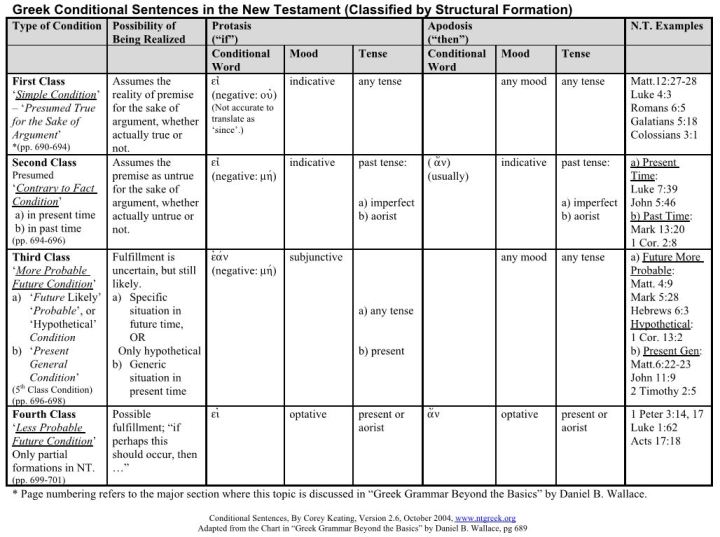
A brother recently commented on an earlier post regarding this very passage, and I thought it would be wise to look into it. It is one of the passages that made me consider conditional security many many years ago.
It bugged me then, being an avowed OSAS (once saved always saved) believer, but as is the case, when you see something you don’t like (or won’t try to understand) denial is bliss!
This passage, specifically verses 11 – 13 are full of if’s. Jam packed. Let’s consider the meaning of “if”
In English “if” can be defined as a word…
- used to talk about the result or effect of something that may happen or be true
- used to say that a particular thing can or will happen only after something else happens or becomes true
- used for introducing a situation or condition that must exist before something else happens
The English “if” is now understood. (snicker snicker)
The wrinkle in this is that the Greek used in the New Testament has four conditional “if’s”.
As if “if” wasn’t conditional enough, eh?

Granted, all four of the conditional clauses in this passage below are of the First Class “Simple Condition” and could easily be translated as a fulfilled condition.
So for example, the first clause could read “If, as is the case we have died with him…”
So before we dig in, lets take a few moments to simply read the text under consideration.
2 Timothy 2:11-14
11 The saying is trustworthy, for: If we have died with him, we will also live with him;
12 if we endure, we will also reign with him; if we deny him, he also will deny us;
13 if we are faithless, he remains faithful– for he cannot deny himself.
14 Remind them of these things, and charge them before God not to quarrel about words, which does no good, but only ruins the hearers.
As you can see, as an avowed OSAS follower, these verses were difficult to find comfort in. Verse 12 was simply to be glossed over.
Let’s consider each of the conditional clauses in the following posts and and try to figger out what Paul is getting at. Lets look at our first clause in this post.
2 Timothy 2:11
If we have died with him, we will also live with him.
Let’s remember that the conditional clause could be translated as “If, as is the case we have died with him”. Paul is stating a case of reality, that these folk receiving the letter, along with Timothy, actually have died with Christ. Upon trusting in the death of Christ and his vicarious death for our sins, Paul teaches in various New Testament passages, that believers also died.
You see, this is taught in many passages, of which the following is representative.
Romans 6:3-5
3 Do you not know that all of us who have been baptized into Christ Jesus were baptized into his death?
4 We were buried therefore with him by baptism into death, in order that, just as Christ was raised from the dead by the glory of the Father, we too might walk in newness of life.
5 For if we have been united with him in a death like his, we shall certainly be united with him in a resurrection like his.
2 Timothy 2:11 seems straightforward, but as I dwell on this phrase, I’m reminded that I have considered our death in the Messiah to be an academic truth. Something that I “believe” but not understand how to practice in my daily life. I have not considered it to be a truth that is “practical”.
I am not so sure about this way of thinking!
Galations 2:20
20 I have been crucified with Christ. It is no longer I who live, but Christ who lives in me. And the life I now live in the flesh I live by faith in the Son of God, who loved me and gave himself for me.
Paul seems to tie my death with Christ to a practical outworking in this life, this life I now live in the flesh.
 Wow – Romans 6 always seemed so theoretical, so academic as I studied it years back. I just never caught the practical application of the truth. And I’m not sure I have a specific application right now.
Wow – Romans 6 always seemed so theoretical, so academic as I studied it years back. I just never caught the practical application of the truth. And I’m not sure I have a specific application right now.
Paul goes on to say that “If we have died with him, we will also live with him”
So if my understanding of Paul is correct, and that this verse is in the present condition, do I have the correct understanding that the living with Him refers to gaining heaven and living with Him after my death?
I just can’t limit this verse to eternity. The Messiah’s death and resurrection are for us to experience today. As believers, we have the privilege of living with Him now. He has supplied the life and the power, and the desire.
Will we enter and enjoy the goodness of the Lord?
The answer is for each of us to decide as we walk this walk of faith.
Please join me in our next post to consider “If we endure, we will also reign with him”
Hope to see you there.
Follow Considering the Bible on WordPress.com
Thanks again for coming to visit. I hope you found something of interest in this post and would appreciate a comment, to begin a discussion.



I so enjoy your work. May I ask we use a few cautions?
Firstly, the letters to Timothy are of questionable origin as to Paul writing them. So they are useful and sacred but not strictly bound to a Pauline analysis (nor Koine Greek word usage).
Second the letter section quoted is quoting an early hymn which isn’t strictly going to follow the academics you are applying. It is invocative text.
Finally, the verses are intended to assert God’s faithfulness in Jesus Christ using human insufficiency by comparison.
In terms of literary structure, verse 2 Tim 2:12b belongs with verse 13.
A saying is trustworthy:
If we have died… Live.
And if we persevere… Reign.
But
If we deny… Denied
And if unfaithful he remains faithful.
Died and persevere are AND conditions.
Deny is singular as unfaithful is equal to deny.
All the best!
Deacon Gerry
LikeLike
Wow. That is awesome information. Thanks for the input.
I assume you recognized that you are the brother I mentioned at the start of the post….
Thanks again.
LikeLike
I really am honored that you take your work seriously and being open to data. Really awesome!!! Together we love Christ.
LikeLike